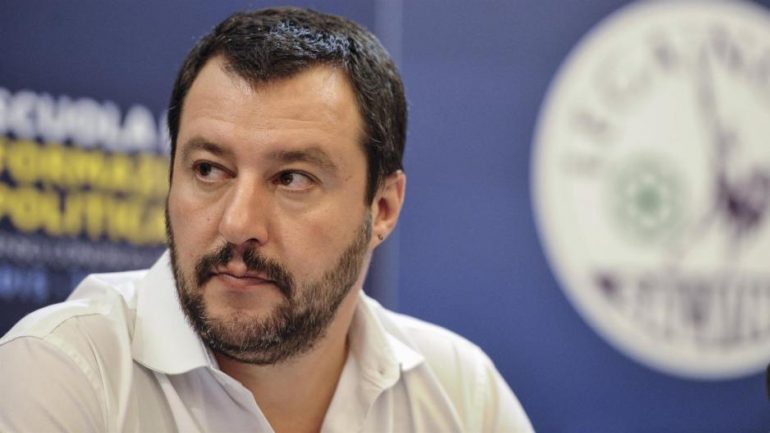Matteo Salvini, the boss of Italy's far right, who took over as Italy's interior minister on Friday, said yesterday that Italy could not be "Europe's refugee camp", while promising "common sense" to avoid shipwrecks and contain the arrivals of refugees and migrants in the country.
"Italy and Sicily can not be the refugee camps of Europe," said the head of the League, which went to Sicily to support its party's local candidates - who until a few years ago had been campaigning for secession. of the rich north of poorer lower Italy.
A day earlier, on Saturday, Salvini had claimed that "the good times for illegal immigrants are over" and called on immigrants to "get ready to pack their bags".
"We will not follow a hard line", but "a line of common sense", said on Sunday the new Minister of Interior, popular in Italy according to polls, who was welcomed at every station by enthusiastic Lega fans, but also left-wing protesters, who were much less.
Under the hot sun at the reception center in Pozzalo, a port in southern Sicily, the two teams almost hold hands.
"We were immigrants in America too, but we had not done such a disaster over there," "this is not a reception, it is a settlement," "if I smell it is from the sweat of work," far-right Lega supporters shouted at the activists. the nightmare of migrants and refugees trapped in Libya.
Maintaining the aggressive tone with which he succeeded, Salvini slightly softened his statements, returning to the frontal attack he made on Saturday against the chartered NGO ships that rescue migrants, accusing them of acting as traffickers. "No one can convince me that illegal immigration is not a business (…) some people make money from children who then die," and that "angers me," he said.
Salvini toured Sicily and made the remarks on the day nearly fifty migrants died in a shipwreck in Tunisia, nine more - including six children - off Turkey, and another off Spain.
"I think this money would be better spent in the countries of origin," Salvini said. "Now, if there are NGOs that want to work for free, that would be good," said the new Italian interior minister, referring to organizations that help receive migrants and refugees on Italian soil and those that save people in the Mediterranean.
Potsalo is at the forefront: it is in this port, as well as some more in eastern Sicily (Augusta, Catania, Messina) where the warships and ships of the humanitarian organizations that have undertaken the rescue of migrants off Libya are arriving.
Inside the reception center, where journalists were not allowed to follow him, Salvini met with about a hundred migrants, including women and children, who arrived in the country on Friday night, hours after the swearing-in of his government. vice president.
The seaside, fenced concrete installation is one of the First Reception Centers (KEPY), or "hotspots", established after 2015 in Italy, as the European Union insisted, so that people arriving in Italy are registered there and not may apply for asylum in another Member State.
EU Home Affairs ministers are expected to discuss the revision of the Dublin Regulation at their council in Luxembourg on Tuesday, but Salvini has already announced that he will not be there: he will be in the Italian parliament, where the alliance government will ask for a vote of confidence. and the Five Star Movement (M5S).
However, it has already made it clear that it opposes the proposed revision of the European regulation, which it says "condemns" the Mediterranean countries.
And what exactly is the idea of the new government in Rome about where the migrants who are saved at sea will land, apart from Italy? "My goal is not to send them to Europe, but to reduce departures," Salvini said, referring to an "obvious imbalance in management, numbers and costs" in the EU's immigration crisis plan. .
Thanks to the controversial arrangements of the previous, center-left government with the Libyan government, arrivals have already dropped by 75% since the summer of 2017. However, despite their 12% increase, deportations did not exceed 6.500 last year and the their multiplication will cost dearly.
To raise funds quickly, Salvini wants a "solid cut" of money to accommodate the approximately 170.000 asylum seekers currently housed across the country. However, many voices warn that the money spent, if allocated properly, can create jobs for Italians and revitalize abandoned rural areas.
